A small minority of religious and scientific communities insist the two can't get along. If you see 'scientocracy' or 'Galileo' invoked, you can be sure rationality has left the discussion.
Almost 50 percent of scientists consider themselves religious and almost 50 percent of Evangelicals, the religious demographic least likely to accept evolution, say that science and religion get along just fine.
But among the general public, only 38 percent feel that way.
How is that possible? The new survey of more than 10,000 Americans found that scientists and the general public are surprisingly similar in their religious practices so why does the general public think there is some great schism? One obvious answer is that it sells newspaper and blog pageviews to demonize any possible opposition. While both sides claim to be tolerant and diverse, they sure are not that way about each other.
Yet outside the vocal poles and media coverage, the cultural landscape looks positively enlightened, even among people criticized as being "anti-science."
Rice University sociologist Elaine Howard Ecklund presented the findings in "Religious Understandings of Science (RUS)" at the (AAAS) conference in Chicago. Slightly fewer scientists attended weekly religious services, compared to the general public - 18 versus 20 percent - while 15 percent of scientists consider themselves very religious compared to 19 percent of the overall population. 13.5 percent read religious texts weekly, compared with 17 percent of the U.S. population, and 19 percent pray daily, versus 26 percent of the U.S. population.
Still, nothing dramatic, nowhere near the disconnect we are told exists.
Ecklund said that the way the science-religion relationship is portrayed in the news media influences the misperception. No surprise there. If you read their science coverage, with its alternating miracle vegetable and scare journalism stories, you see the problem every day. But it isn't just news media. Scientists themselves are rather far out of the mainstream politically and culturally and in their blogs and twitter feeds, they routinely ridicule anyone different from them, which is going to be religious people and Republicans.
"Most of what you see in the news are stories about these two groups at odds over the controversial issues, like teaching creationism in the schools. And the pundits and news panelists are likely the most strident representatives for each group," she said. "It might not be as riveting for television, but consider how often you see a news story about these groups doing things for their common good. There is enormous stereotyping about this issue and not very good information."

Professor Elaine Howard Ecklund is a sociologist at Rice University. Credit: Jeff Fitlow/Rice University
Ecklund noted that portions of the two groups are likely to stay put in their oppositional camps. As an example, she found that evangelical Protestants are twice as likely as the general population (11 percent) to consult a religious text or religious leader for questions about science.
Other key findings:
- Nearly 60 percent of evangelical Protestants and 38 percent of all surveyed believe "scientists should be open to considering miracles in their theories or explanations."
- 27 percent of Americans feel that science and religion are in conflict.
- Of those who feel science and religion are in conflict, 52 percent sided with religion.
- 48 percent of evangelicals believe that science and religion can work in collaboration.
- 22 percent of scientists think most religious people are hostile to science.
- Nearly 20 percent of the general population think religious people are hostile to science.
- Nearly 22 percent of the general population think scientists are hostile to religion.
- Nearly 36 percent of scientists have no doubt about God's existence.
Ecklund found another counterintuitive result in the survey. The conventional wisdom is that religious people who work in science will have more doubts about their faith, but the survey revealed the opposite: Evangelical scientists practice religion more than evangelical Protestants in the general population.
"Those scientists who identify as evangelical are more religious than regular American evangelicals who are not in science," Ecklund said.
"Evangelical scientists feel that they've been put under pressure or they find themselves in what they view to be more hostile environments," she said. "They potentially see themselves as more religious, because they're seeing the contrast between the two groups all the time."
RUS is the largest study of American views on religion and science. It includes the nationally representative survey of more than 10,000 Americans, more than 300 in-depth interviews with Christians, Jews and Muslims -- more than 140 of whom are evangelicals -- and extensive observations of religious centers in Houston and Chicago.
The study is being provided to the AAAS Dialogue on Science Ethics and Religion program to help foster dialogue between religious groups and scientists.






Comments